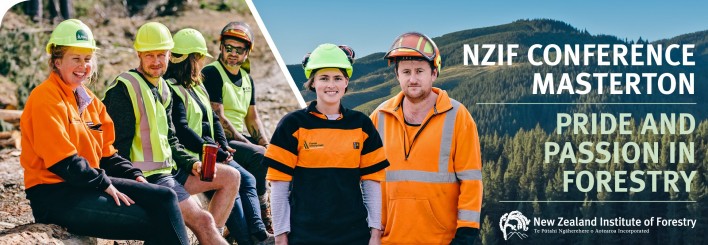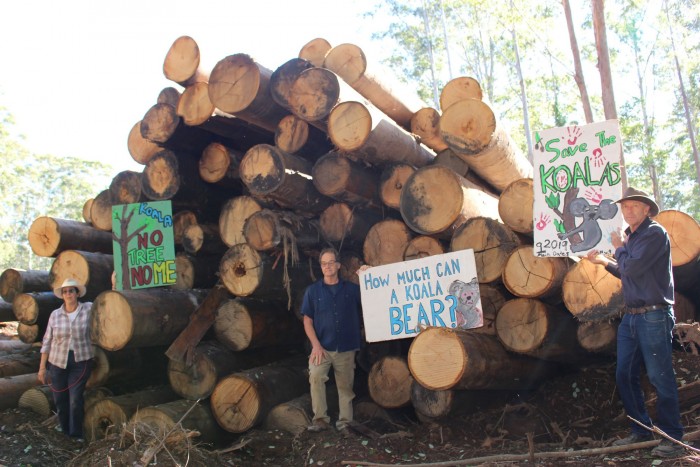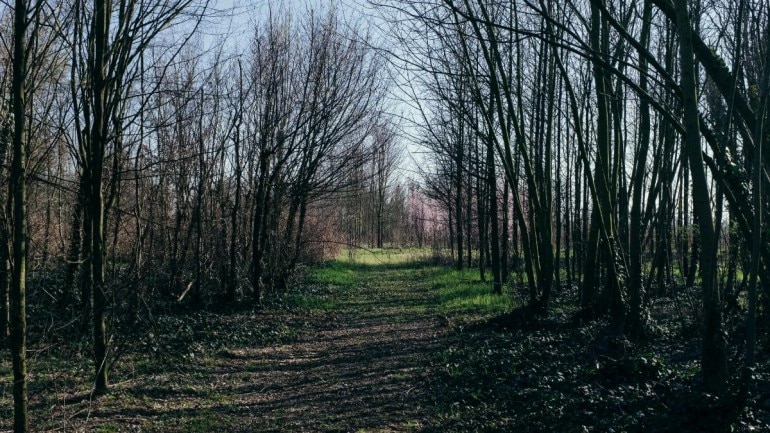30th March 2020 Newsletter
PRESIDENTS COMMENT
Message to all members (previously sent by email 26th March)
Our world has changed rapidly over the past couple of weeks. Our government has taken drastic action early, and with the strong support of almost all New Zealanders. We understand the rationale for this action, and we have graphic evidence, from some other countries, of the consequences of not making such a decision. The next step is for all of us as individuals to give this action the best chance of achieving the desired outcome.
The NZ Institute of Forestry is a network set up nearly one hundred years ago to support professional forestry. I want to ensure that our network does as much as it can to support our members through this difficult time. Our objective, as far as possible is to maintain “business as usual”, but also to seek feedback from members on any other ways you would like NZIF to support you.
The NZIF office will remain open for members, but only for telephone and email contact. Our office at the Forestwood Centre in Wellington is closed, and our staff will be working from home until further notice. Our administrator Raewyn Agnew will continue to provide service to members, and can be contacted at admin@nzif.org.nz or by phone at +64 4 974 84 21. Please don’t hesitate to contact her with any questions or requests. Anything that Raewyn is not able to deal with directly will be escalated to the President and Vice President, in the first instance.
Chris Perley will continue to produce the newsletter every two weeks and Trevor Best (and the Journal production team) are continuing to work on future issues of the Journal. Projects will continue to be worked on by Jay Matthes and others, and the Council will continue to meet via teleconference.
Invoices will be sent out as normal on 1 April. Please pay the invoice if convenient, however we are expecting delays from members and their employing organisations under a number of possible scenarios. Please contact us if you have any concerns about your invoice.
Voting for the next President will close at 5 pm on Tuesday 31 March. Please cast your vote!
The 2020 Conference has been cancelled. The timing and set up for the AGM will be discussed by Council at its next meeting on 6th April, however the AGM will be held prior to 30 September as required by the rules, and will be a stand-alone event this year, probably by teleconference. More on this later.
Zoom (an excellent teleconferencing facility) is available for local sections and other committees and working parties to run meetings, or simply to have a chat and provide support. I would encourage local section chairs to consider how they might like to use this facility to support members in their region. An ad hoc group of members would also be welcome to use this facility. Please contact Raewyn if you want to book a time for a Zoom meeting.
If members need help in any way, do not hesitate to contact us. Keep safe and take care.
Nga mihi,
David Evison
President, NZIF
President’s comment
In terms of international relations, our current challenge with COVID-19 is one of those problems where the interests of each country largely align with those of the rest of the world, and effective individual actions by each country to limit the spread of the virus benefit other countries. WHO has identified the need to provide aid to those countries with runaway epidemics, and those with health systems less able to cope with such events. It has also shown how this strategy is in the best interest of other countries who are more able to restrict and manage the spread of COVID-19.
Assuming the experience of those countries who first encountered COVID-19 is indicative of our ability to exert control at a national and global level, at some stage we will turn our minds back to climate change, which the Economist magazine in 2009 called “…the hardest political problem the world has ever had to deal with. It is a prisoner’s dilemma, a free-rider problem and the tragedy of the commons all rolled into one. At issue is the difficulty of allocating the cost of collective action and trusting other parties to bear their share of the burden...”
The COVID-19 crisis will give us an interesting insight into what can be achieved (in terms of carbon emissions reductions) under certain circumstances, and may change consumers’ appetites for international and domestic air travel, sea cruises, etc., and hopefully governments’ appetites to lead genuine reductions in greenhouse gas emissions. However, genuine efforts to combat climate change must be a combination of government action and personal behaviour change.
More than a year before the term COVID-19 had been coined, this Council reduced the number of face-to-face Council meetings. We moved from seven face to face meetings in Wellington (six hours in duration) to four face-to-face and seven teleconference meetings of 90 minutes.
Teleconference meetings only consider operational matters and the change provides more immediacy and continuity in dealing with operations. The four face-to-face meetings provide a better opportunity to focus on strategic planning and other core governance issues.
This was something of a “no brainer” change, but I was recently asked by a member to investigate the nature of the savings in more detail, so here goes.
- We save time – I estimate we have reduced the time for each Councillor on meetings from 63 hours to 46 hours per year. This is a significant saving of time over a year.
- We also save cost – assuming cost is directly proportional to the number of meetings, we save 3/7 of our cost. Less, of course, the cost of a Zoom subscription.
- We reduce air travel and therefore carbon emissions
I used the following website to calculate emissions for flights taken by Council members from Auckland, Nelson, Christchurch and Dunedin to Wellington.
https://ecss-congress.eu/2017/17/index.php/venue/calculate-flight-emissions
It turns out we reduced carbon emissions by 42%, from 6.8 tonnes CO2e to 3.9 tonnes, a saving of 2.9 tonnes. To put this in context, I consulted the Ministry for the Environment’s emissions tracker:
https://emissionstracker.mfe.govt.nz/#NrAMBoEYE4F12JcAiAcgUwC7PsATOHqJAOy4AcKOsQA
Gross emissions for New Zealand are about 80 million tonnes. Domestic aviation is about 1 million tonnes. So if everyone was able to reduce their domestic air travel by 42% New Zealand would reduce emission by 420,000 tonnes of CO2e. Which isn’t an enormous contribution, but if the same thinking (looking for “low hanging fruit”) was applied across some more significant sources of emissions, it shows how we can reduce our carbon emissions with least pain, and several side benefits, as above.
The NZIF experience in reducing the number of face-to-face meetings would probably be shared by a number of the “quick-win” actions individuals and other organisations can take to reduce carbon emissions: These “quick wins” may:
- make a small contribution on an individual basis, but collectively add up to a significant reduction.
- take time and determination to put in place, and require people to adjust to a different way of doing things
- have other benefits in time and cost, which by themselves could provide sufficient justification for their implementation.
After the COVID-19 crisis has passed I hope we will have new confidence and resolve to tackle the problem of climate change and GHG emissions. Best wishes to all members as we work through the first week of physical isolation.
Keep safe,
David Evison, President NZIF
INSTITUTE NEWS
NZIF Elections
Nominations for the NZIF Council and Registration board have closed and voting will held for the position of President.
- Nominations for the position of President are as follows:
- Euan Mason
- James Treadwell
- The uncontested Council and Registration board positions are as follows:
Vice President: Peter Hill
Treasurer: Kent Chalmers
Secretary:
Council: Russell Dale
Bridget Fraser
Peter Houston
Edwin Jansen
Murray Parrish
Christopher (Kit) Richards
Registration Board: Andrew McEwen
Janet Scott
As there has been no nomination for Secretary, this position will be filled by election at the upcoming annual general meeting.
Voting will be available to paid members only, will be anonymous, and will open Sunday 15th March on the NZIF website. Access to voting will be through the NZIF Members only page.
Voting will close at 5pm on Tuesday 31st March and results will be announced during the week following.
Any problems with logging in or voting, please contact jm@nzif.org.nz, or phone the NZIF office +64 4 974 8421.
Ngā mihi
Jessica Brown
Secretary NZIF
NZIF Members

NZIF Members are invited to share their COCID-19 experiences and any relevant insights they may have learned to other members through the NZIF Newsletter. This is a members’ forum. All comments are welcome.
Official COVID-19 NZ Govt Info Site
Learn the simple steps you can take to unite against the virus and slow its spread. Find out what help is available, FAQs and get the latest updates.
Official Covid-19 NZ Govt Info: For Businesses, Organisations & Employees
Ministry of Social Development Assistance
MBIE Coronavirus Media release
Business.govt.nz, part of the Ministry of Business, Innovation and Employment, has sourced information from 15 government departments so businesses can access all they need to know about the Covid-19 coronavirus outbreak in one place.
Business.govt.nz Director Matt Kennedy-Good says the outbreak and the global efforts to contain it affect New Zealand businesses in many ways.
“It’s vital that businesses stay up to date, but with so many things to consider and changing regularly, it can be overwhelming, particularly for small businesses.
“We want to make it a little bit easier for them, so they don’t have to blind trawl through numerous websites to find what is relevant to them.
“Whether you’re an employer with concerns about your staff and workplace, an exporter with overseas customers, or you are planning to travel abroad – this page is your single source of truth for government information on what to do and what assistance is available.”
As well as information for employers, exporters and importers, topics such as tax assistance, health and safety are covered, as well as information for landlords, tenants and the education sector.
The content is presented in an easily digestible format with links for more in-depth reading, and is kept up to date as new information becomes available.
The page has already been visited more than 45,000 times since it was published on the Business.govt.nz website earlier this month, with many repeat visitors using it regularly.
Stay informed with issues that matter by joining the 235,000 small businesses that subscribe to the business.govt.nz monthly newsletter.
Media contact: +64 27 442 2141 or email media@mbie.govt.nz
From the Registrar
Successful 5 Year Registration Review
Continuing Registration:
- Jan (David) Derks of Harihari – Recognised as having General skills in forestry, but with specialist skills in indigenous forestry
End of Year Requirements.
Hopefully the “lock down” will give some Registered Members time to complete and email their annual Code of Ethics, Real Estate and Professional Indemnity Insurance declarations as well as attend to their CPD for year ending 31 December 2019.
As at 25 March, 62 RM’s have entered and had their CPD accepted and 29 have forwarded their COE, RE and PI declarations. There are currently 92 RM’s in total.
Any member of the NZIF has the right to object to a new application or an application for review. Any objection should be lodged with the Registrar registrar@nzif.org.nz within 20 working days of the first appearance (30th March 2020) of the notice in this newsletter, specifying the grounds for the objection.
Alan Bell, Registrar
NZIF Registration Board
registrar@nzif.org.nz
Registration Review
The following members are due for 5-year review of their status as a Registered Member during 2020:
- Owen Springford
- Nigel Chandler
- Brian Johnson
- Paul Molloy
- Peter Brown
- Peter Clark
- John Hornby
- Allan Laurie
- Hamish Levack
- Andrew McEwen
- Peter Houston
- Craig McMiken
- Reagan Thompson
- Geoff Cameron
- John Ellis
- Brian Rawley
Alan Bell, Registrar
NZIF Registration Board
APPLICATIONS OPEN FOR NZIF FOUNDATION 2020 AWARDS & SCHOLARSHIPS
Applications are invited for the awards and scholarships offered by the NZIF Foundation for 2020. The total value of awards offered is $29,500.
The awards open for application are:
- One Future Forest Scholarship for post graduate research of up to $10,000
- The New Zealand Redwood Company Scholarship of $5,000 for an undergraduate scholarship at the University of Canterbury School Forestry
- Chavasse Travel Award of up to $3,500 to assist a mid-career person to travel overseas or to bring an overseas person to NZ
- Jon Dey memorial award of up to $3,500 to assist research projects in the areas of work study or new technology aimed at improving forest engineering and harvest productivity
- Otago Southland Award of up to $3,000 to assist a project of relevance to forestry in the Otago/Southland region
- Mary Sutherland Scholarship of $1,000 for a polytechnic student
- University Undergraduate Scholarship of $1,000
- Frank Hutchinson Postgraduate scholarship of $1,000
- Student poster prizes at NZIF Conference (1st, 2nd and 3rd prizes of $800, $500 and $200)
Applications are now open. Further details on the Foundation web page available through www.nzif.org.nz , (link on lower right hand side of page).
Applications must be received by the Foundation administrator (foundation@nzif.org.nz) no later than 5pm on Monday 18th May 2020. The awards will be announced at the Awards Dinner of the joint conference of the NZ Institute of Forestry being held in Masterton from 28th to 30th June 2020.
Enquires to the Foundation chair am.mcewen@xtra.co.nz or phone +64 274 733 262
Please pass on this notice to your networks and to anyone you think may be eligible to apply. Membership of NZIF is not a requirement for application.
About the NZIF Foundation
The NZIF Foundation was established in 2011 by the NZ Institute of Forestry to advance education in relation to forestry. This includes encouraging and supporting forestry related research, education and training through the provision of grants, scholarships and prizes; promoting the acquisition, development and dissemination of forestry related knowledge and information and other activities that do not conflict with the charitable purpose. For the purposes of these awards, forestry is broadly defined to include all those activities involved in the management and use of forests and their products, the objects of which are the production of wood or other forest benefits and the maintenance of the environment in its most beneficial form. All forests in New Zealand, whatever their purpose, are encompassed in the definition.
Andrew McEwen
NZIF Foundation Chair
NZIF Fees Increase
It is that time of the year when the NZIF Council reviews the Annual Subscriptions. Since our last increase of subscription rates in 2018, NZIF’s costs have been under general inflationary pressure. While these pressures have been modest Council’s view is that NZIF are better to pass on smaller increases more frequently. We think large increases are more difficult for members to absorb and this increase is significantly less than the 2018’s increase.
As a council we have delivered projects that have benefited members, the redevelopment of the website, improvements with the newsletter, rewriting the handbook is underway and continuing improvements to the Registration scheme. In addition to these we continue to support the forestry profession through advocacy, lobbying and connectivity.
|
Membership Class |
Current Fees (ex GST) |
20 - 21 Fees (ex GST) |
|
Ordinary |
$270 |
$278 |
|
Registered |
$400 |
$412 |
|
Associate |
$190 |
$196 |
|
Graduate |
$175 |
$180 |
|
Retired |
$100 |
$103 |
The table above shows the changes to our subscription prices. We look forward to your continued support.
Kent Chalmers
Treasurer NZIF
Events

Details of the upcoming national and international events of interest to members of NZIF have obviously been disrupted by the Covid-19 pandemic and shut down.
In particular, the Conference and Celebration for 50 years Canterbury School of Forestry has been postponed, and the NZIF Annual Conference 2020 in Masterton has been cancelled.
Te Uru Rākau Feedback: A Forest Strategy for Aotearoa New Zealand
Te Uru Rākau is looking at how to harness the collective vision of New Zealanders to cultivate the forests of the future. To do this, they’re developing a Forest Strategy that will guide us over the next 30 years, and beyond.
Te Uru Rākau are asking for shared views on what a forest strategy means to you, why it matters, and what a great forest system would look like.
If you want to get in touch with Te Uru Rākau about the Forest Strategy, or to be added to the mailing list so you can keep in touch with what’s happening, then email foreststrategy@mpi.govt.nz.
Details are in the Forest Strategy page.
Latest NZ Journal of Forestry is On-line
Find latest journal here.

MPI Sustainable Forestry Bulletin
MPI’s Sustainable Forestry Bulletin is available through the subscription link. The bulletin outlines new information, upcoming requirements etc relating to the ETS, etc.
Forestry Career Portal
For career options, jobs are available advertised on this site
https://www.forestrycareers.nz/
Institute of Chartered Foresters (UK)
The ICF provides a newsletter with news and blogs as well as relevant information for members through this link.
Royal Society New Zealand
The NZ Institute of Forestry is affiliated with the Royal Society, with many co-memberships. For those interested in finding out what is happening, receiving newsletters and other alerts, please follow the link here.
RSNZ Rutherford Medal now to include Humanities.
Changed Address?
It is important NZIF has up-to-date contact details for members so we can stay in touch and keep you informed of news, events and our journal. If you have changed your residential and/or postal address, or any other contact details, please let the office know. You can email us at admin@nzif.org.nz.
IN THE NEWS
World: As Temperatures Increase, Forests are Having More Trouble Soaking up Carbon
On Earth, one of the most important factors regulating our climate is the carbon cycle. This refers to the processes by which carbon compounds are sequestered by biological (photosynthesis) and geological processes and released through volcanic activity and organic processes (decay and respiration). For billions of years, this cycle has kept temperatures relatively stable on Earth and allowed for life to flourish.
For the past few centuries, human activity has tipped the scales to the point that some refer to the current geological epoch as the Anthropocene. According to a new study by an international team of researchers, human activity is also leading to a situation where tropical rainforests (a major sequester of carbon dioxide) are not only losing their ability to soak up carbon but could actually be adding to the problem in the coming years.
The study that describes these findings, “Asynchronous carbon sink saturation in African and Amazonian tropical forests“, recently appeared in the journal Nature. This research effort was led by scientists from the Royal Museum for Central Africa in Tervuren, Belgium, and included research scientists from over 100 universities, forestry and conversation organizations from all around the world.
Shedding light on how much carbon tropical forests can absorb
Tropical forest ecosystems are an important part of the global carbon cycle as they take up and store large amounts of CO2. It is however uncertain how much these forests' ability to take up and store carbon differ between forests with high versus low species richness. New IIASA research sheds light on this question aiming to enhance our ability to predict tropical ecosystems' strength as global carbon sinks.
The authors of the new study published in Scientific Reports, investigated how many species are needed for tropical ecosystem functioning and associated ecosystem services, including carbon sequestration, to project future changes in the climate that affect ecosystem carbon storage and thus might trigger further climatic change through increased greenhouse gas emissions. It is important that we are able to construct realistic scenarios of how tropical ecosystems function to help improve current conservation and management strategies, so they can continue to provide their valuable services into the future.
"We wanted to find out how much detail we need to know in order to make valid assumptions in terms of the strength of tropical carbon sinks, in other words, how much carbon is actually sequestered by tropical vegetation? In addition, we wanted to know whether it is biotic factors, that is, differences between plant species that are responsible for capturing more or less carbon from the atmosphere; or if differences are due to abiotic, or local environmental factors like soil properties, that also influence carbon sink strength in tropical ecosystems," explains study lead author Florian Hofhansl, a postdoc researcher with the IIASA Ecosystems Services and Management, and Evolution and Ecology Programs.
World Forest Day (21st March): Internet is in love with this dreamy viral video of nature. Seen yet?
To celebrate World Forest Day, IFS officer Susanta Nanda shared a video of the beauty of nature with an important message.
2st March was World Forest Day and Twitter is filled with videos and pictures depicting the beauty of our natural wonders. Even Indian Forest Service officer, Susanta Nanda, took to Twitter to share a beautiful video of a stream flowing through the forest and it is the most calming thing you will see today.
Susanta shared the video with an important message, which read, "If you go to a desert, you will [not] hear this mysterious voice: Be wise, protect your forests! No better place to find your solace than this. On world forestry day, tributes & prayers for countless green warriors across the globe."

Australia: Protesters ‘really frustrated’ by logging after fires
On Saturday four conservationists stopped logging in koala habitat in Comboyne State Forests west of Port Macquarie.
Spokesperson for the protesters Susie Russell said they had been informed during the week that a neighbour had seen and heard koalas in that patch of forest.
‘With so much prime koala habitat destroyed in the fires, every bit of koala habitat is important.’
UK: School trips cancelled? Try these virtual experiences to bring the outside in
The (UK) Forestry Commission is offering virtual tours of working forests with the help of Google Expeditions, providing pupils with 360 degree views on a mobile or tablet device, heightened by a virtual reality headset. The expeditions allow pupils to visit a tree nursery to find out which species could make up forests in the future as well as other aspects including machines used in forestry, different habitats and the importance of trees in the face of climate change.
One teacher, Gen Ellison-Smith of Hannah Moore Primary School in Bristol who previously tried the experience with her Year 2 class, said: “The students absolutely loved using the virtual reality headsets and learning all about the forest. After the class, they wouldn’t stop talking about the different jobs they wanted to have.”
World: The Corona Connection
The same forest destruction that accelerates climate change can also encourage the emergence of diseases such as the coronavirus, Indigenous peoples’ leaders said March 13 in New York, as they criticized Cargill and other multinational companies for replacing forests with soy, palm, and cattle plantations.
“The coronavirus is now telling the world what we have been saying for thousands of years—that if we do not help protect biodiversity and nature, then we will face this and worse future threats,” said Levi Sucre Romero, a BriBri indigenous person from Costa Rica who is the coordinator of the Mesoamerican Alliance of Peoples and Forests.
The loss of habitat has brought wild animals into closer contact with humans and domesticated animals, research has found, enabling diseases such as the coronavirus to jump the animal-human barrier and spread through human-to-human contact.
NZ: Coronavirus: Forestry showing some signs of recovery
The forestry sector was the first to feel the effects of Covid-19 as ports in China prevented the offloading of logs and workers here faced the chop.
But slowly, there looks to be some signs of recovery.
Australia: 'The forest is now terribly silent': land set aside for threatened species entirely burnt out
A series of before-and-after photos show the devastating impact of last summer’s bushfires on Mount Kuark in eastern Victoria.
New photos showing the devastating impact of bushfire in east Gippsland forests are sparking renewed calls for the Victorian government to rethink its approach to logging and bring forward the promised 2030 phase-out of the native timber industry.
A series of before-and-after pictures by the photographer Rob Blakers show the impact of last summer’s fires on the slopes of Mount Kuark, known as one of the few places in Australia where cool and warm temperate rainforests grow together.
NZIF Administrator
Email: NZIF Office
Mobile: +64 22 653 3750
NZIF Registration Board
Email: Registrations
Mobile: +64 27 463 1118
Complaints
Email: Complaints
Appeals
Email: Appeals
© All rights reserved. No part of this site may be reproduced, adapted, or distributed without prior written permission
We are a forum to exchange ideas, opinions and information about forestry.
We encourage and help our members attain and maintain the highest standards of their profession.







